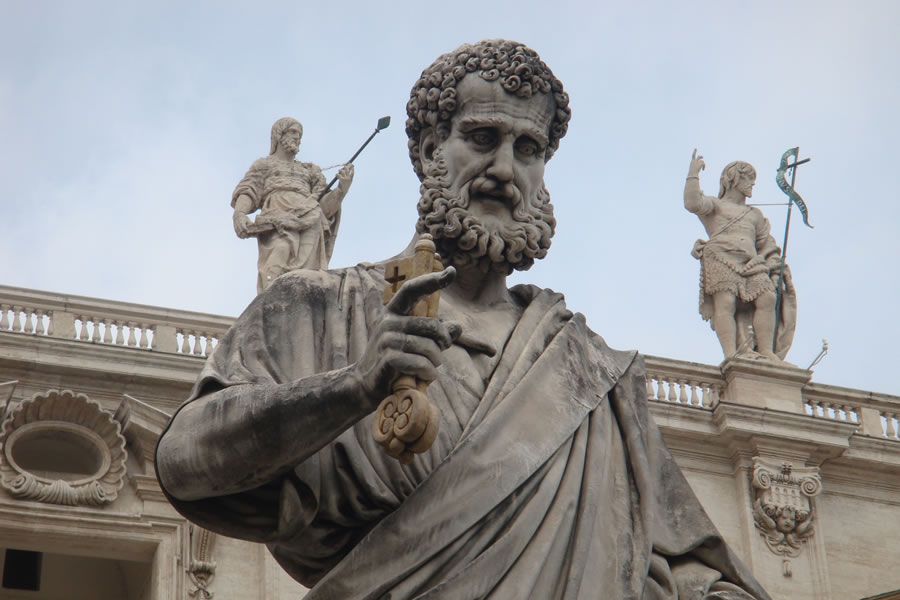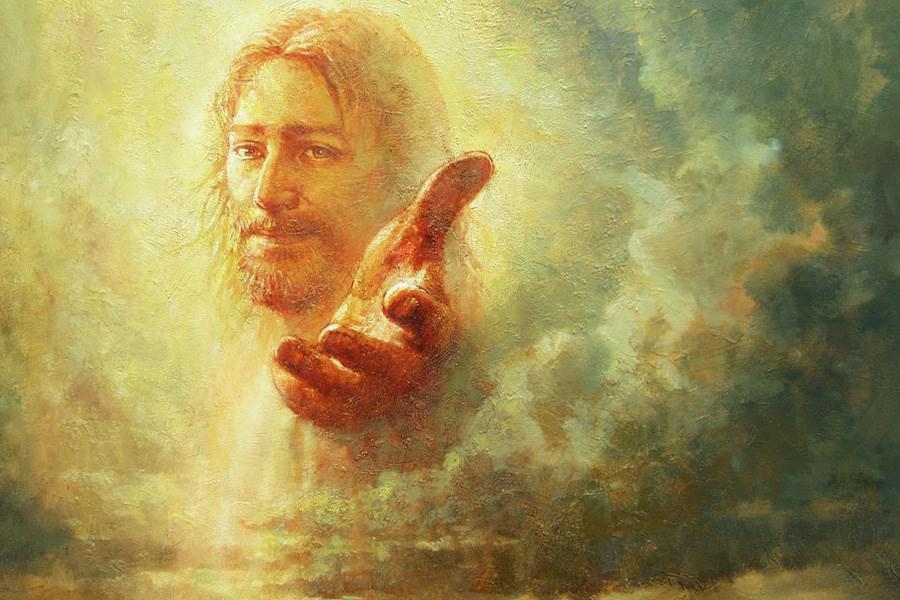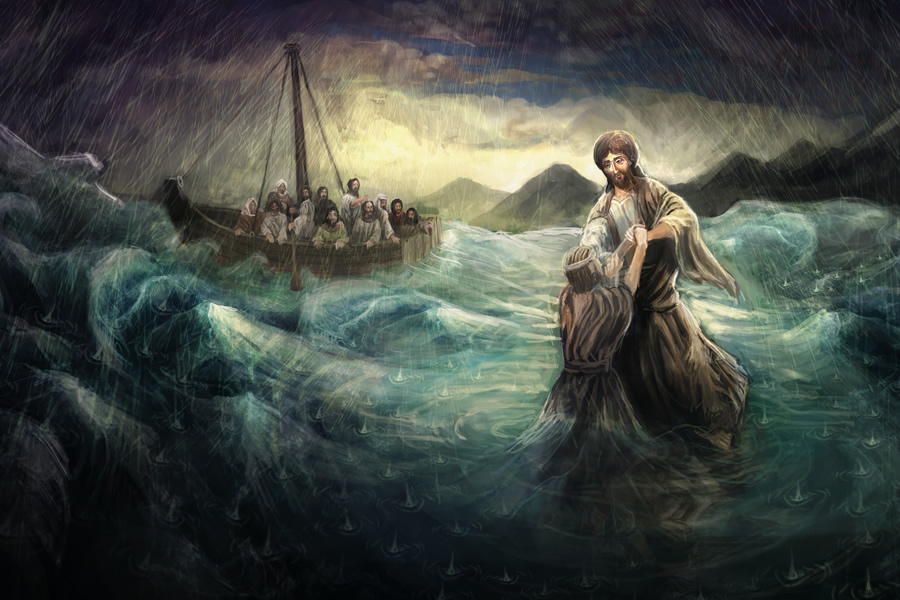St. Francis of Assisi Weekly Reflections

But Who Do You Say That I Am?
08-27-2023Weekly ReflectionWe Celebrate Worship Resource, Vol. 48, No. 3In today’s Gospel, after Jesus asks his disciples how others identify him, he asks them a more personal question: “But who do you say that I am? Peter immediately replies, “You are the Christ, the Son of the living God” (Matthew 16:15-16). Or, more accurately, it is Simon who replies, inspiring Jesus to rechristen him Peter, the rock (petrain Greek) upon which he will build his church. Quite a while later, after Jesus is raised from the dead and appears to his disciples, Jesus asks Peter another question: “Do you love me?” (John 21:15-17). Peter’s answers lead Jesus to give him a commission. Despite Peter’s earlier doubts and denials, Jesus chooses him to tend his flock, to guide his flock, and to feed his flock. Though we are not Simon Peter, we too have been given a commission: “Go, therefore, and make disciples of all nations” (Matthew 28:19). So Jesus asks us that same questions today he asked Peter. Beyond what others say, who do we say that Jesus is? Do we see him in our neighbor? Do we love him?
Who do you say that Jesus is? Do you love him?
Y Ustedes, ¿Quién Dicen Que Soy Yo?
En el Evangelio de hoy, después de que Jesús le pregunta a sus discípulos cómo me identifican los demás, le hace una pregunta más personal: “Y ustedes, ¿quién dicen que soy yo? Pedro responde inmediatamente: “Tú eres el Mesías, el Hijo del Dios vivo” (Mateo 16:15-16). O, más exactamente, es Simón quien responde, instando a Jesús a rebautizarlo como Pedro, la roca (petraen griego) sobre la que edificará su iglesia. Bastante tiempo después, después de que Jesús resucita de entre los muertos y se aparece a sus discípulos, Jesús le hace otra pregunta a Pedro: “¿Me amas?” (Juan 21:15-17). Las respuestas de Pedro llevan a Jesús a darle una comisión. A pesar de las dudas y negaciones anteriores de Pedro, Jesús lo elige para cuidar de su rebaño, guiarlo y alimentarlo. Aunque no somos Simón Pedro, a nosotros también se nos ha dado una comisión: “Id, pues, y haced discípulos a todas las naciones” (Mateo 28:19). Así que Jesús nos hace las mismas preguntas hoy que le hizo a Pedro. Más allá de lo que digan los demás, ¿quién decimos nosotros que es Jesús? ¿Lo vemos en nuestro prójimo? ¿Lo amamos?
¿Quién dices tuque es Jesús? ¿Lo amas?
Representatives of Christ
08-23-2023Question of the WeekReading I: Isaiah 22:15, 19-23 - Eliakim chosen by God
Reading II: Romans 11:33-36 - Praise of God
Gospel: Matthew 16:13-20 - Peter the rock
Key Passage: He said to them, “But who do you say that I am?” Simon Peter answered, “You are the Messiah, the Son of the living God.” (Matthew 16:15–16)
Adults: If you were asked, how would you explain Jesus to a person who had not heard of him?
Kids: Who do you tell people Jesus is?
Representantes De Cristo
Lectura I: Isaías 22:15, 19-23 - Eliaquim escogido por Dios
Lectura II: Romanos 11:33-36 - Alabanza a Dios
Evangelio: Mateo 16:13-20 - Pedro la roca
Pasaje Clave: Él les dijo: “Pero, ¿quién decís que soy yo?” Simón Pedro respondió: “Tú eres el Mesías, el Hijo del Dios viviente”. (Mateo 16:15–16)
Adultos:Si te preguntaran, ¿cómo le explicarías a Jesús a una persona que no haya oído hablar de él?
Niños:¿Quién le dices a la gente que Jesús es?

God Has Mercy Upon Us All
08-20-2023Weekly ReflectionWe Celebrate Worship Resource, Vol. 48, No. 3As the Romans expanded the boundaries of their empire far beyond the city of Rome, they enjoyed levying taxes in their new territories, but they needed to hire locals to collect them. In those days, tax collection was a lucrative business, for many tax collectors demanded more than what was actually owed and pocketed the difference. Because their neighbors viewed them as collaborators, they were not welcome in the temple or in respectable circles. But Jesus welcomed them, going so far as choosing the tax collector Matthew as a disciple. So hearing today’s Gospel passage from Matthew’s perspective adds a layer to the story. No doubt Matthew, like the Canaanite woman, had been called a dog or some similar slur. But Jesus saw him as a lost sheep, someone outside the flock. Matthew, the outcast tax collector, is a natural target of Jesus’ mission. The Canaanite woman is as well, and a special one, for by her great faith and persistence she risked rejection, too. We are all rejected by someone at some time. Perhaps it is for who we are, or for what we do, or for our race, ethnicity, gender, sexuality, or political leanings. But Jesus finds us all, accepts us all, heals us all. As Paul, an outcast himself, wrote to the residents of Rome itself, God has mercy upon us all.
Who do you treat as an outcast in some way? Like Jesus, will you take a second look, listen a second time?
Dios Tiene Piedad De Todos Nosostros
Amedida que los romanos ampliaron los límites de su imperio mucho más allá de la ciudad de Roma, disfrutaron de impuestos sobre sus nuevos territorios, pero necesitaban contratar locales para recogerlos. En aquellos días, la recaudación de impuestos era un negocio lucrativo, ya que muchos recaudadores de impuestos exigían más de lo que realmente se debía y se embolsaba la diferencia. Debido a que sus vecinos los veían como colaboradores, no eran bienvenidos en el templo o en los círculos respetables. Pero Jesús los recibió, llegando a elegir al recaudador de impuestos Mateo como discípulo. Entonces, escuchar el pasaje del evangelio de hoy desde la perspectiva de Mateo agrega una capa a la historia. Sin duda, Mateo, como la mujer cananea, había sido llamado perro o un insulto similar. Pero Jesús lo vio como una oveja perdida, alguien fuera del rebaño. Mateo, el recaudador de impuestos marginado, es un objetivo natural de la misión de Jesús. La mujer cananea también es, y especial, porque por su gran fe y persistencia también arriesgó el rechazo. Todos somos rechazados por alguien en algún momento. Quizás sea para quienes somos, o por lo que hacemos, o para nuestra raza, etnia, género, sexualidad o inclinaciones políticas. Pero Jesús nos encuentra a todos, nos acepta a todos, nos cura a todos. Como Pablo, un marginado, escribió a los residentes de Roma, Dios tiene piedad de todos nosotros.
¿A quién tratas como marginado de alguna manera? Como Jesús, ¿echarás un segundo vistazo, escuchas por segunda vez?
All Are Welcome
08-20-2023Question of the WeekReading I: Isaiah 56:1, 6-7 - The Lord’s house open to all
Reading II: Romans 11:13-15, 29-32 - Israel’s final conversion; the triumph of God’s mercy
Gospel: Matthew 15:21-28 - Faith of the Canaanite woman
Key Passage: For my house shall be called a house of prayer for all peoples. (Isaiah 56:7)
Adults: The woman in this story was persistent in prayer. For what do you pray insistently?
Kids: For what do you ask God to give you most often?
Todos Son Bienvenidos
Lectura I: Isaías 56:1, 6-7 - La casa del Señor abierta a todos
Lectura II: Romanos 11:13-15, 29-32 - La conversión final de Israel; el triunfo de la misericordia de Dios
Evangelio: Mateo 14:22-33 - Jesús camina sobre el agua
Pasaje Clave: Porque mi casa será casa de oración para todos los pueblos. (Isaías 56:7)
Adultos: La mujer de esta historia era persistente en la oración. ¿Por qué rezas con insistencia?
Niños: ¿Qué le pides a Dios que te dé más a menudo?

Put your Trust in Jesus
08-13-2023Weekly ReflectionWe Celebrate Worship Resource, Vol. 48, No. 3When we are in fear or under extreme stress, it’s natural to panic, to react without thinking and make rash decisions. Witness Saint Peter today. Seeing what they think is a ghost during a terrible storm, the disciples begin to scream. After Jesus identifies himself and reassures them, Peter climbs overboard, daring to walk on the water like Jesus. When the wind comes up, doubt creeps in. Peter’s trust in the Lord blows away. He panics. To recall a parable we heard a few weeks ago, his faith had been planted on rocky ground, springing to life at once but then withering for lack of roots. Peter’s faith was not yet well-anchored, so on rocky ground, or on rocky waters, he loses it. But the extravagance of the sower is eventually rewarded. Just as Elijah found God in the gentle calm after the storm, Peter finds the Lord in the gentle calm above the raging sea. May we find refuge in the Lord amid the storms in our own lives.
What storm are you experiencing in your life right now? Can you put your trust in the Lord to lead you through the wind and waves?
Pon tu Confianze en Jesús
Cuando tenemos miedo o estamos bajo un estrés extremo, es natural entrar en pánico, reaccionar sin pensar y tomar decisiones precipitadas. Sea testigo de San Pedro hoy. Al ver lo que creen que es un fantasma durante una terrible tormenta, los discípulos comienzan a gritar. Después de que Jesús se identifica y los tranquiliza, Pedro se sube por la borda, atreviéndose a caminar sobre el agua como Jesús. Cuando sopla el viento, la duda se cuela. La confianza de Pedro en el Señor desaparece. Él entra en pánico. Para recordar una parábola que escuchamos hace unas semanas, su fe había sido plantada en terreno pedregoso, saltando a la vida de inmediato pero luego marchitándose por falta de raíces. La fe de Pedro aún no estaba bien anclada, así que en terreno pedregoso, o en aguas pedregosas, la pierde. Pero la extravagancia del sembrador finalmente es recompensada. Así como Elías encontró a Dios en la calma apacible después de la tormenta, Pedro encuentra al Señor en la calma apacible sobre el mar embravecido. Que podamos encontrar refugio en el Señor en medio de las tormentas en nuestras propias vidas.
¿Qué tormenta estás experimentando en tu vida en este momento? ¿Puedes poner tu confianza en el Señor para que te guíe a través del viento y las olas?
Faith in the Lord
08-13-2023Question of the WeekReading I: 1 Kings 19:9, 11-13 - Elijah’s flight to Horeb
Reading II: Romans 9:1-5 - Grief for the Jews; God’s free choice
Gospel: Matthew 14:22-33 - Jesus walks on water
Key Passage: Jesus immediately reached out his hand and caught him, saying to him, “You of little faith, why did you doubt?” (Matthew 14:31)
Adults: When have you doubted the loving care of God for you as the apostles did in the boat?
Kids: How do you know that Jesus is with you at all times?
Fe en El Señor
Lectura I: 1 Reyes 19:9, 11-13 - La huida de Elías a Horeb
Lectura II: Romanos 9:1-5 - Dolor por los judíos; la libre elección de Dios
Evangelio: Mateo 14:22-33 - Jesús camina sobre el agua
Pasaje Clave: Inmediatamente Jesús le tendió su mano, los sotuvo y le dijo: “Hombre de poca fe, ¿por qué dudaste?”
(Mateo 14:31)
Adultos: ¿Cuándo has dudado del cuidado amoroso de Dios por ti como lo hicieron los apóstoles en la barca?
Niños: ¿Cómo sabes que Jesús está contigo en todo momento?

Transfiguration
08-06-2023Weekly ReflectionWe Celebrate Worship Resource, Vol. 48, No. 3Peter, James, and John were given a wonderful gift: the opportunity to see Jesus transfigured before their eyes and to hear the voice of God from the heavens. They are not the first to have been afforded a revelatory but fleeting glimpse of God’s glory. In the first reading, Daniel gives an account of a vision he had—over the course of a single night—of “the Ancient One” all in white and the Son of man receiving dominion over the earth. He seemingly never had this vision again. When Christ was born, the magi saw a bright star over Bethlehem from miles and miles away, but presumably the star eventually faded and became just another star in the sky. The earth trembled when Jesus died on the cross, leading unbelieving witnesses to believe, but soon the earthquake ended. The transfiguration is another glimpse, however brief, of God’s glory made manifest to a certain few. We are today’s witnesses of God’s glory. With eyes and ears of faith, we ourselves may have moments of sudden realization of God’s presence in the world. May these moments sustain us as we make our way through life, hopeful of eternal glory.
How can you use eyes and ears of faith to see and hear beyond what the world recognizes?
Transfiguración
Pedro, Santiago y Juan recibieron un regalo maravilloso: la oportunidad de ver a Jesús transfigurado ante sus ojos y escuchar la voz de Dios desde los cielos. No son los primeros a los que se les ha concedido un vislumbre revelador pero fugaz de la gloria de Dios. En la primera lectura, Daniel da cuenta de una visión que tuvo, en el transcurso de una sola noche, del “Anciano” todo de blanco y el Hijo del hombre recibiendo el dominio sobre la tierra. Aparentemente nunca volvió a tener esta visión. Cuando nació Cristo, los magos vieron una estrella brillante sobre Belén desde millas y millas de distancia, pero presumiblemente la estrella finalmente se desvaneció y se convirtió en una estrella más en el cielo. La tierra tembló cuando Jesús murió en la cruz, haciendo creer a los testigos incrédulos, pero pronto el terremoto cesó. La transfiguración es otro vistazo, por breve que sea, de la gloria de Dios manifestada a unos pocos. Somos los testigos de hoy de la gloria de Dios. Con los ojos y oídos de la fe, nosotros mismos podemos tener momentos de súbita realización de la presencia de Dios en el mundo. Que estos momentos nos sostenga en nuestro camino por la vida, con la esperanza de la gloria eterna.
¿Cómo puedes usar los ojos y los oídos de la fe para ver y escuchar más allá de lo que el mundo reconoce?
Jesus Transfigured
08-06-2023Question of the WeekReading I: Daniel 7:9-10, 13-14 - Daniel’s vision of the Kingdom of God
Reading II: 2 Peter 1:16-19 - Apostolic witness
Gospel: Matthew 17:1-9 - Transfiguration of Jesus
Key Passage: This is my beloved Son, with whom I am well pleased; listen to him. (Matthew 17:5b)
Adults: Is there a time that you were chosen to witness something amazing?
Kids: What do you think God’s voice sounds like?
Jesús Transfigurado
Lectura I: Daniel 7:9-10, 13-14 - La visión de Daniel del Reino de Dios
Lectura I:I 2 Pedro 1:16-19 - Testimonio apostólico
Evangelio: Mateo 17:1-9 - Transfiguración de Jesús
Pasaje Clave: Este es mi Hijo muy amado, en quien tengo puestas mis complacencia; escúchenlo. (Mateo 17:5b)
Adultos: ¿Hubo algún momento en que fuiste elegido para presenciar algo increíble?
Niños: ¿Cómo crees que suena la voz de Dios?